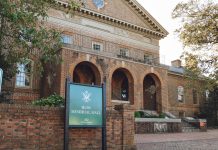I love trash. Well, that is to say, I love diverting trash from landfills. My name is Stephen Somerville, and I am responsible for the collection of all recyclables coming from student residences on campus. I came to the College of William and Mary from the sustainably-minded Warren Wilson College, just outside of Asheville, N.C. I learned a lot about people and waste there, and I have continued to learn from the College community.
Currently at the College, it is not only possible but pretty easy to recycle just about all types of paper, with the exceptions of paper towels, toilet paper, napkins, tissues, paper cups, paper plates, milk cartons, any paper with excessive food residue and cardboard. Aluminum cans, pie tins, foil, soup cans, glass bottles and jars and plastic bottles and jugs made from number one and plastics are also recyclable on campus. All of these materials can be placed in any of the blue recycling bins found in every student residence building, as well as some high traffic outdoor locations. You can recycle used ink cartridges by taking them to the campus Apple Store, with more drop-off locations coming in the future. You can also recycle used batteries by taking them to the Environmental Health and Safety office located beside Hunt Hall on North Boundary Street. And did you know that the food waste from the cafeterias gets picked up twice a week to be turned into compost?
Many students will ask why recycling is so restricted. Why can’t we recycle all types of plastic bottles and cups and bags ? The answer has to do with some convoluted economics and organic chemistry, but the short story is that things like plastic bags and solo cups are made from a chemically different form of plastic and are also produced in a physically different manner than are number one and number two plastic bottles.
Due to these differences, recycling anything other than ones and twos requires different processes and is seen as economically unfeasable. The good news is that you can collect all those plastic grocery bags and take them to grocery stores like Food Lion. Also, if you are so inclined, you can collect and take number five plastics —Arizona Tea bottles, most hard plastic bottle caps, some yogurt and cream cheese tubs, etc. — to any Whole Foods store, although there aren’t any closer to the College than Richmond. However, if people show enough interest and make some effort, the College may be convinced to fund the shipping of number five plastics to be recycled. In regard to why some paper can’t be recycled this comes down to physicochemical processes. When paper is recycled, it all gets mixed together in a vat of water and chemicals, and is turned into a kind of pulp used to make new paper. When food or production contaminants like grease, oil and waxy linings get thrown into the mix, they can be difficult or impossible to remove efficiently, and thus can spoil the whole batch.
So, next time you are up late studying and have some trash to throw away, think about where you are sending it — will it end up in a landfill somewhere to sit and be worthless, or will it end up in a recycling facility where it will be made new again?


































